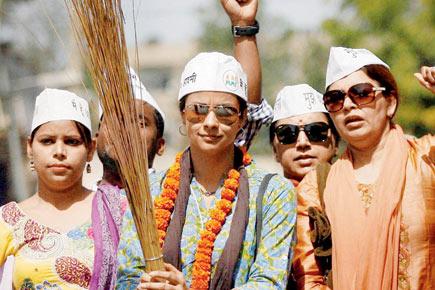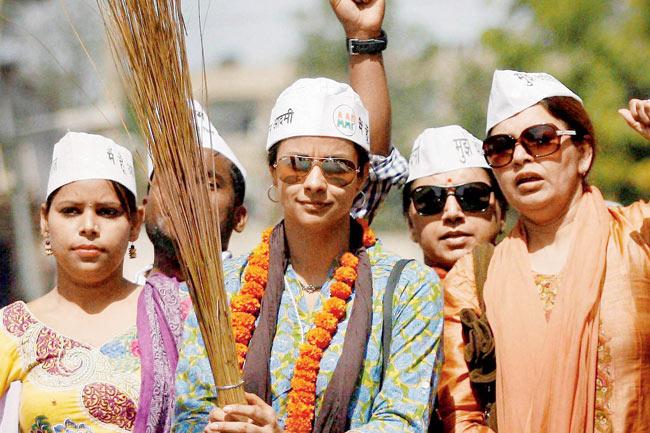A former US Congressman Tip O’Neill is famous for the phrase “All politics is local” which compresses to a belief that voters are only concerned about local issues and every day concerns


A former US Congressman Tip O’Neill is famous for the phrase “All politics is local” which compresses to a belief that voters are only concerned about local issues and every day concerns. This probably explains why American politicians hold more town hall meetings than gigantic rallies like ours. Here it is all about size. Giant hoardings, garish flags, high, very high podiums, hundreds of loud speakers and the ‘big picture’. The idea is to overwhelm the voter with the idea that the politician and party are powerful.
ADVERTISEMENT
 Locating politics: Gul Panag and several other Lok Sabha candidates have parked themselves in their constituencies and are focusing only on local issues, from garbage collection, power cuts, school admissions and electricity outages to public transport. Pic/AFP
Locating politics: Gul Panag and several other Lok Sabha candidates have parked themselves in their constituencies and are focusing only on local issues, from garbage collection, power cuts, school admissions and electricity outages to public transport. Pic/AFP
From the Prime Minister who spoke about economic reforms and liberalisation in Assam to Narendra Modi who spoke about Pakistan and biryani for its visiting President to Rahul Gandhi with “Congress ek soch hai”, we are seeing a lot of grand ideas being pedalled. How important is it to the voter? Does the person who has waited for three hours in the hot afternoon sun waiting for the Dear Leader to arrive by chopper really care to hear about FDI in retail or about the future benefits of some economic corridor? Is she going to vote for that?
Observe the campaign styles of Nandan Nilakeni, Shashi Tharoor, Gul Panag, Nitin Gadkari and several others who have parked themselves in their constituencies and are focusing only on local issues, from garbage collection, power cuts, school admissions and electricity outages to public transport. Some candidates realise that issues like Uniform Civil Code, Aadhar Card, Right to Information and such will get no traction. They stick to what might seem mundane issues. But if it gets the votes, why not?
You might baulk when Sanjiv Ballian (BJP) in Muzaffarnagar says this election is about “Swabhimaan (self-esteem) not sadak (roads i.e. development)”. But if you have lived in a village in India where inter-religious riots have taken place recently then yes, elections are about security in numbers. Big, intangible ideas go onto the back burner. The hate speech by Congress party’s Imran Masood against Modi has landed him in a lock-up but when Rahul Gandhi addressed a public meeting in Saharanpur, standing next to him on the dais was Masood’s wife. The party’s high command has no option but to endorse his candidature. It’s local.
Most politicians who are returning to their constituencies face uncomfortable questions about unfulfilled promises and discontentment among voters who complain of neglect for the past five years. Where is the road you promised?
Where is the school, the bridge, the railway station? You went to Delhi and forgot about us. That is the refrain. Forget local, forget your re-election.
During the 2013 Delhi assembly elections, Aam Aadmi Party tapped into this demand by innovatively coming up with a manifesto for every assembly constituency. While other parties may still be presenting national manifestos, they have also recognised the need to address the local aspirations at the constituency level. It is a different matter that they didn’t stay on in government to fulfill those promises.
At some point of time, “Congress mukt-Bharat” and “Congress ek soch hai” is going to stop mattering, while issues like Benaras weavers wanting Modi to crack down on Benarasi sarees made in Surat come to front, as Kerjiwal has to talk of sewer and river. Ashok Chavan, Sriramulu, Pramod Muthalik, Suresh Kalmadi still matter even if TV channels froth in the mouth about them. In Amritsar, Arun Jaitley and Capt Amrinder Singh hurl the insider-outsider charge at each other, but both are Punjabi elite who are not locals.
The issue of local candidates is just not about parochial considerations. For the voters, it is also about easy access to their MP. Will an ‘outsider’ MP have a house in the constituency and always be available to the locals? Or will she stay at Delhi or Mumbai and come back after five years?
In a sense, the rise of regional leaders, whether Naveen Patnaik, Mamata or Jayalalithaa, can also be attributed to local aspirations. These leaders know the local issues, their voters know them and here is the thing, the voters think their local concerns will be foremost for these leaders even at the Centre. So the major political parties better factor this in: in the event of not getting 272 on their own, they will have to deal with these leaders who will bring to the table local issues and local aspirations.
Let’s face it. Most Indians want their candidates to not get bogged down with the big picture. They want their local issues resolved. Yes, it is still roti-kapda-makaan-naukri and bijli-sadak-pani. And school and factory. Its cumulative result is national. But the politics is local.
Smita Prakash is Editor, News at Asian News International. You can follow her on twitter @smitaprakash
 Subscribe today by clicking the link and stay updated with the latest news!" Click here!
Subscribe today by clicking the link and stay updated with the latest news!" Click here!







